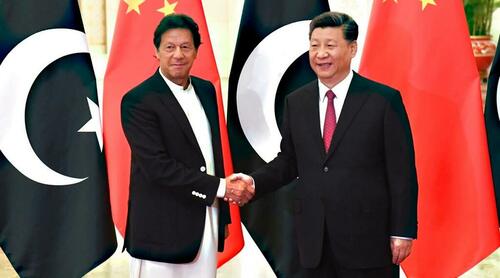
War games highlighting cooperation between China and its allies are not a new thing, but such events are increasing in frequency and the nature of these exercises indicates that current global tensions are more than just a passing phase.
Chinese naval training with Russia has dramatically expanded in the past year, with exercises around Japan and Taiwan as well as exercises in the Indian Ocean which included Iran. The war games suggest a model for countering US military power in the region, as well as possible training for locking down the South China Sea after a Chinese invasion of Taiwan. Concerns are growing within nations like Japan and India that the string of naval exercises this year are a form of saber rattling leading to further geopolitical strife.
Russian military representatives suggested last month that the country is preparing for a 'colossal war with NATO.' In the meantime, China's rhetoric against Taiwan has escalated, with the Chinese Defense Minister threatening “all out war” if they ever try to assert official independence. Whether or not the US would actually intervene in defense of Taiwan is still in question under the Biden Administration.
Pakistan's military alliance with China is increasing at a time when the nation's economy is on the verge of implosion. The official inflation rate has hit 13.37% and the Pakistani Finance Minister, Miftah Ismail, has stated publicly that the country is facing economic collapse if they do not receive a long awaited IMF loan agreement to the tune of $36 billion ($30 billion more than they initially asked for). It is possible that a closer military alliance is a trade Pakistan is willing to make in order to access greater economic support from the Chinese.
In the meantime India, another economic ally of China with precarious border relations, is left wondering what Pakistan's military relationship with China means for them. The naval drills this week followed the visit of Pakistan's Chief of Army Staff General to China where he held talks with China's top ranking General. The statements by Pakistan claim a 'rock solid' alliance between the two militaries.
Pulling Pakistan in close may be China's attempt to force India into deeper ties, beyond the economic and into the realm of defense. India and China have become highly interdependent in financial terms, but India's military connections to the west remain. A strong alliance between Pakistan and China could be used as leverage to force India to choose support for China in military engagements, or at least remain neutral during a major conflict (like an invasion of Taiwan).
China would likely suggest that strong economic and defense ties will secure peace in the region under their leadership, and prevent nuclear conflagration between India and Pakistan. What it would really accomplish is a free hand for China to project military power in the Pacific, specifically against Taiwan. With China, Russia, India and Pakistan all in alignment, or at least unwilling to help NATO interests, it would be very difficult for the west to use geopolitical deterrence as a means to stop a regional war. Clearly, sanctions are not working against Russia for this very reason, so why would they work against China
War games alone are never a sure sign of impending conflict, but the wash of war games across multiple eastern nations, the areas in which they are operating, and the economic conditions involved all indicate that at the very least we will be facing a powder keg environment in the Pacific for many years to come. What this means is that China will be able to operate with more impunity and with less fear of a US or NATO response. And, with the current leadership available in the US, there is very little to scare China away from pursuing their greatest obsession – The surrender of Taiwan into the communist fold.
War games highlighting cooperation between China and its allies are not a new thing, but such events are increasing in frequency and the nature of these exercises indicates that current global tensions are more than just a passing phase.
Chinese naval training with Russia has dramatically expanded in the past year, with exercises around Japan and Taiwan as well as exercises in the Indian Ocean which included Iran. The war games suggest a model for countering US military power in the region, as well as possible training for locking down the South China Sea after a Chinese invasion of Taiwan. Concerns are growing within nations like Japan and India that the string of naval exercises this year are a form of saber rattling leading to further geopolitical strife.
Russian military representatives suggested last month that the country is preparing for a ‘colossal war with NATO.’ In the meantime, China’s rhetoric against Taiwan has escalated, with the Chinese Defense Minister threatening “all out war” if they ever try to assert official independence. Whether or not the US would actually intervene in defense of Taiwan is still in question under the Biden Administration.
Pakistan’s military alliance with China is increasing at a time when the nation’s economy is on the verge of implosion. The official inflation rate has hit 13.37% and the Pakistani Finance Minister, Miftah Ismail, has stated publicly that the country is facing economic collapse if they do not receive a long awaited IMF loan agreement to the tune of $36 billion ($30 billion more than they initially asked for). It is possible that a closer military alliance is a trade Pakistan is willing to make in order to access greater economic support from the Chinese.
In the meantime India, another economic ally of China with precarious border relations, is left wondering what Pakistan’s military relationship with China means for them. The naval drills this week followed the visit of Pakistan’s Chief of Army Staff General to China where he held talks with China’s top ranking General. The statements by Pakistan claim a ‘rock solid’ alliance between the two militaries.
Pulling Pakistan in close may be China’s attempt to force India into deeper ties, beyond the economic and into the realm of defense. India and China have become highly interdependent in financial terms, but India’s military connections to the west remain. A strong alliance between Pakistan and China could be used as leverage to force India to choose support for China in military engagements, or at least remain neutral during a major conflict (like an invasion of Taiwan).
China would likely suggest that strong economic and defense ties will secure peace in the region under their leadership, and prevent nuclear conflagration between India and Pakistan. What it would really accomplish is a free hand for China to project military power in the Pacific, specifically against Taiwan. With China, Russia, India and Pakistan all in alignment, or at least unwilling to help NATO interests, it would be very difficult for the west to use geopolitical deterrence as a means to stop a regional war. Clearly, sanctions are not working against Russia for this very reason, so why would they work against China?
War games alone are never a sure sign of impending conflict, but the wash of war games across multiple eastern nations, the areas in which they are operating, and the economic conditions involved all indicate that at the very least we will be facing a powder keg environment in the Pacific for many years to come. What this means is that China will be able to operate with more impunity and with less fear of a US or NATO response. And, with the current leadership available in the US, there is very little to scare China away from pursuing their greatest obsession – The surrender of Taiwan into the communist fold.







